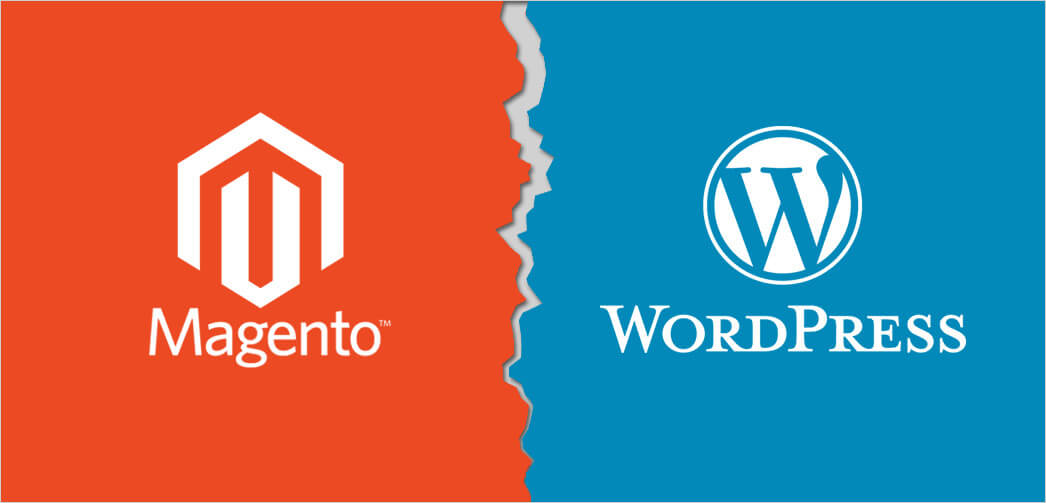Which Is The Best Ecommerce Platform: Magento Or WordPress

ADMIN
March 16, 2021COVID-19 has not only affected the health of the people but also impacted several offline businesses around the world. The devastation by the pandemic is beyond complete repair, but we cannot undo the business's loss caused by it. What we can do is to move to the digital platform, i.e. eCommerce platform.
A report by IBM states that pandemic has quickened the move from physical stores to digital shopping by roughly five years.
So, here when we talk about the e-commerce platform, we have two great choices, i.e. Magento and WordPress. Today, we are going to put these platforms on different scales for a better comparison and choose the right option.
So, are you ready to find the turning point to the highway?
Woah. . .
Magento and WordPress- An Overview
Magneto is a very familiar and trusted name in the eCommerce segment. It is a highly flexible open-source platform, wherewith some basic knowledge of development, one can develop and grow an online store.On the other hand, WordPress is a content management system with hundreds of themes, plugins, inbuilt tools to create a personal blog, e-portal, and eCommerce website.
Stats
· WordPress powers 35% of the Internet in 2020. · More than 60% of CMS websites are on WordPress. · 28% of the e-commerce website goes through WordPress (WooCommerce). · The WordPress Plugin Directory features 55,000+ plugins · 25,000 active sites use Magento. · 11% of the websites using Magento are based in the US. · Magento is the second most popular eCommerce platform globally.Price
The good news is that both WordPress and Magento are open-source software, and both are free to download. But another news is that to launch your e-commerce store, you need to pay certain charges including domain, premium themes, hosting, and other charges.Both Magento and WordPress have similar domain registration and hosting charges; but what sets them apart from each other are their premium themes, developer, and extension cost.
Magento offers free themes, but with simple functionality, however, its premium themes are majorly preferred by the developers. Premium themes range from $17 to $499. WordPress offers 4000 free themes, while its Premium themes range from $60 to $200.
You need to consider the cost of developers for both platforms.
Winner: Its draw as each has its prime features. Magento because of its premium themes and additional extensions, ideal for eCommerce. While WordPress offers several themes options without costing a fortune.
Blogging
Blog sections add more weightage to your store, as it has the potential to attract more clients and ultimately leads to a boost in sales value. In Magento, you need to use a custom extension to add the blog section in a store.With WordPress's new block editor, it is easy to create content from thousands of plugins and themes that are specially for blogging purposes. WordPress allows you to customize the appearance and behaviour of the blog section as per your requirement.
Winner: WordPress stands out as a clear winner here because of its great options and flexibility.
Security
Security is the primary concern in this digital world as the eCommerce business involves payment. Almost every day, we hear about the rise in the number of digital security threats, which further worsens the situation even more.Magento is known for offering highly fortified and robust security features. You just need to ensure that the extension you are installing is reliable enough to keep away all cyber threats & offer the best and secure services to customers.
WordPress loses out in security as it is more vulnerable to security threats and attacks. Too many plugins offered by WordPress add more risk to users. So, it is advisable to do thorough research before implementing or updating any plugins.
Winner: Magento is a winner in the security round.
SEO
It is very important to spread the word about your business on the digital platform to survive for a long duration. You solely cannot depend on paid ads or social media, instead, you must optimize your e-commerce platform for better visibility.You can optimize your eCommerce platform through several practices like adding a responsive theme, removing duplicate content, adding meta descriptions to all product pages, and much more. In Magento, you need to add all tasks manually, so it is ideal for those who are well-versed in SEO.
WordPress offers better SEO features when compared to Magento. It is ideal for experienced and non-technical users to optimize the platform. Advanced users can remove unnecessary code preventing sites from slowing down, while non-technical users can make use of plugins to simplify the optimization process.
Winner: WordPress stood out as the clear winner in the SEO round.
Features
Both Magento and WordPress are equipped with well-versed features that make them ideal for different uses. Magento offers features for full-fledged eCommerce sites including inventory management, product pages, and order tracking.While WordPress offers plenty of content management tools including embedded images, create categories, pages, posts, and more. You can install plugins for a better eCommerce platform.
Winner: Magento becomes the winner in this round.
Conclusion:
Ultimately, when it comes to Magento VS WordPress, there is no clear winner as both have amazing features and certain limitations. But we hope that the Magento VS WordPress comparison helps in identifying the purpose of the site and based on that you can choose the right one.
Start your business journey better with Top App Firms
A Laravel Website with Admin access Starter project with AdminLTE theme and basic features.
Submit Project